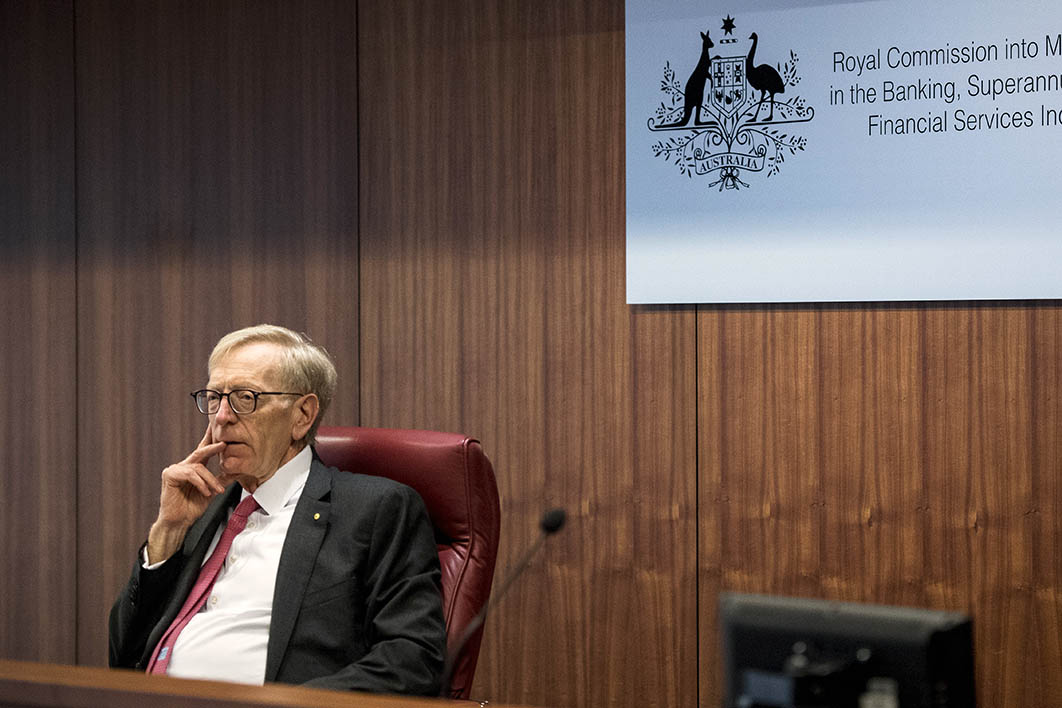When it was announced that the financial services royal commission would be looking not just at banks but at the entire industry, including the superannuation funds, bankers were no doubt delighted. With one year to report and a vast landscape to traverse, surely the heat on their part of the industry would be less intense? To their dismay, revelations at the commission about their own behaviour, and that of other financial institutions, have captured the headlines and given everyone, not least the dilatory Turnbull government, a jolt.
Already the commission has claimed a spectacular wicket with the departure of AMP’s chief executive, Craig Meller, and the position of other institutions’ executives could prove untenable as more revelations emerge. Latest indications suggest that the commission’s work will be extended by a year.
As of 13 April, the commission had received 3433 public submissions, an overwhelming 69 per cent of which relate to banks, with 8 per cent covering the super funds and 7 per cent financial advice. Though the commission doesn’t have the power to order compensation payments or resolve disputes, the financial institutions will find it hard not to recompense the victims of their misconduct, and the regulators — the Australian Securities and Investments Commission, or ASIC, and the Australian Prudential Regulation Authority — will be forced to act more firmly against erring banks.
Submissions on consumer lending were the subject of the first round of hearings. The case studies compiled by the commission revealed that all players, including the major banks, at least one foreign bank and a mortgage broker were involved in conduct harmful to consumers. The dodgy practices related mainly to residential mortgages, credit cards and vehicle finance.
In the case of the National Australia Bank, for example, an internal scheme offering incentives for new customers was abused by staff and potential “introducers” from 2013 to 2016. According to the commission, there was a “reliance on false documentation to support loan applications; use of incorrect income figures in loan serviceability assessments; dishonest application of customer signatures on Introducer consent forms; and/or the misstatement of loans in loan documentation.” The misconduct, it concluded, “potentially resulted in customers taking out loans which were unsuitable for them.” Conflicts of interest also came to light, and some bank staff were involved in an alleged multi-branch bribery ring involving forged documents, payslips and Medicare cards.
This case study echoes the reckless lending that was allowed to occur in the lead-up to the 2008 US subprime crisis. Fuelled by the pressure on loan officers to achieve targets and sweetened with bonuses and other incentives, so-called NINJA loans were provided to borrowers who had no income, no jobs and no assets. The NAB revelations highlight the care that needs to be taken in designing incentive schemes and putting checks and balances in place.
Another of the royal commission’s case studies concerned a car loan granted to a carer by Westpac despite the fact that she informed the bank she couldn’t afford the payments of $259 a fortnight. A car dealer, remunerated by the bank through a process called flex commissions, saddled her with a used car that she believed was new and then, astonishingly, set the rate of interest to be paid by the customer. (ASIC has since banned these commissions.)
In financial advice, too, glaring misconduct has come to light. A nurse whose dream was to start a bed-and-breakfast business was misled by Westpac financial advisers. They told her to sell her home, obtain $1 million in life insurance, and roll over her superannuation into a self-managed fund to be used to borrow up to $2 million. Those funds would be used to buy the desired business, where she would also live herself. She followed the advice but later found that the law didn’t permit the use of self-managed super funds to buy an owner-occupied home. She now lives in a rented property.
The current hearing culminated last week with the revelation that AMP had lied to ASIC for nearly a decade over allegations that customers had been charged fees for advice that was never provided.
What explains this state of affairs? After all, the industry has been the subject of a series of inquiries over the years, the most recent being the Financial System Inquiry, chaired by former banker David Murray in 2014. That inquiry, considered the biggest overhaul of the Australian financial system since 1997, made forty-four recommendations aimed at making the financial system efficient (to support growth), resilient (to withstand shocks) and fair to consumers. It argued that confidence and trust needed to be enhanced by “creating an environment in which financial firms treat their customers fairly.” Its recommended approach combined self-regulation with regulatory changes to strengthen financial firms’ accountability. A little over three years on, that mix hasn’t delivered the desired benefits.
My view, expressed in opinion pieces and interviews in recent years, is that the banks’ misbehaviour can only be checked if criminal provisions are introduced. Now, the shocking revelations at the commission appear to have forced the government to do just that. The treasurer has announced that executives who engage in corporate and financial misconduct will face up to ten years in jail and institutions fines of up to $210 million. The move, though belated, is in the right direction.
Incentives need to be designed to ensure that an institution’s interests and those of its clients are aligned to produce fair outcomes — the opposite of what was revealed to have happened at the NAB. In many cases, not just at the NAB, unreasonable sales targets force employees to resort to unethical methods, such as withholding critical information from clients, as happened in the bed-and-breakfast case. If top management places ethics at the centre of its expectations of staff, that attitude will filter down. Appropriate protections and incentives for whistleblowers will be crucial.
Among financial advisers, it seems that nothing has been learnt from the Storm Financial scandal. Many clients are unaware that financial advice must, by law, be provided in writing and that only such advice can be acted on. ASIC’s MoneySmart website provides useful consumer information, but the regulator should also mandate that financial advisers provide additional material to their clients about what they are entitled to expect.
In some ways, the latest revelations were a moment of shock and awe for the Australian people and the government. With an election due within little more than a year, both major political parties will be especially sensitive to what happens at the commission. Labor was quick to blame the government and has been calling for an apology; the treasurer responded with tougher penalties to demonstrate government’s seriousness.
Finally, the regulatory authorities need to use their powers more aggressively to ensure that the harmed party’s financial position is restored to where it was prior to the misleading advice. The deterrent effect, in combination with the other mooted changes, could be significant and lasting. ●




